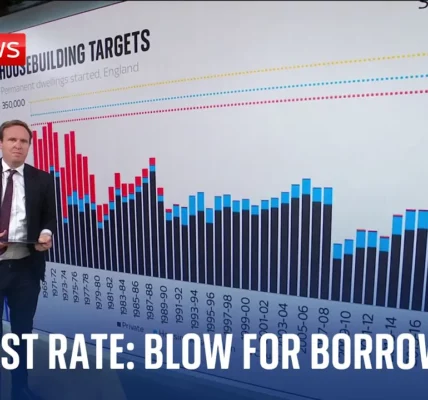Can We Get UK Politics Working Again? | The Sky News Daily

In a time of increasing polarization and distrust in politics, this article delves into the current immigration debate impacting the UK electoral landscape, as discussed by Sky News political editor Beth Rby and her guests. Explore the multifaceted perspectives on immigration, public services, and the necessity for substantive dialogue in the upcoming elections.
Introduction
The trust in UK politics has reached an all-time low, and as we approach the next general election, the question arises: can we restore functionality and satisfaction within our political system? This article elaborates on the recent discussions surrounding immigration, public service pressures, and the societal perceptions that frame current political narratives. The 2024 elections have become a battleground for immigration debates, with various stakeholders expressing their views on its impact on communities and public resources.
The State of Trust in UK Politics
Trust in politics is fragile, with many citizens expressing dissatisfaction with the current government and its handling of pressing issues, particularly immigration. The 2012 political climate is often recalled as a time of relative stability and satisfaction, in stark contrast to today’s polarized environment. The emergence of influential political figures, such as Labour’s Jess Phillips and Conservative peer Ruth Davidson, highlights the ongoing struggle to address electoral dysfunction.
Understanding Public Sentiment on Immigration
Current surveys, including one conducted exclusively for Sky News, reveal that a significant portion of the population harbors concerns regarding immigration. In fact, 43% of respondents believe immigration negatively impacts society, compared to 35% who view it positively. This sentiment varies by region, with London and Scotland showing a higher inclination towards seeing immigration as beneficial.
Regional Variations in Immigration Perspectives
- In London and Scotland, more individuals are likely to view immigration as a force for good.
- In contrast, other regions express significant concerns regarding the pressures of high migration on public services.
Case Study: Swindon and Migration
Swindon, a historical railway town, has seen its foreign-born population grow significantly, with one in five residents now born outside the UK. This demographic shift provides a unique lens through which to examine the complexities of migration.
Community Perspectives
During visits to local businesses, opinions on migration often reflect a nuanced understanding:
- Local barbershop owner: Sees the influx of foreign workers as positive, contributing to a multicultural workforce.
- Customer experience: Expressed mixed feelings about foreign workers, acknowledging their hard work while feeling overwhelmed by the number of migrants.
- A former asylum seeker: Criticized the current levels of immigration, citing long wait times for public services as a primary concern.
The Economic Impact of Migration
According to recent data, around 6.8 million foreign-born workers represent over 20% of the UK workforce. This statistic serves as a critical point in the immigration debate, with implications for both the economy and public sentiment.
Employment Statistics
- 36% of foreign-born workers are in high-skilled occupations, surpassing the percentage of UK-born workers in similar roles.
- 82% of working-age migrant men are employed, compared to 78% of their UK-born counterparts.
Perceptions of Job Competition
Data on employment can support conflicting narratives regarding migration:
- Proponents argue that migrants are essential for economic growth.
- Opponents claim that migrants take jobs away from local workers.
The Realities of Net Migration
While public concern often centers on small boat arrivals, the majority of immigration to the UK is legal. Recent figures indicate that in the last year alone, approximately 1.2 million people migrated to the UK, with a majority arriving through legal channels.
Historical Context
The current migration figures are unprecedented, with net migration rates higher than any time since 1855. This historical perspective underscores the need for informed discussions about the implications of such drastic demographic shifts on British society.
Political Responses and Future Directions
As the elections approach, both Labour and Conservative parties are faced with the task of addressing public sentiments surrounding migration. The challenge lies in balancing economic needs against public concerns regarding resource strain.
Calls for Honest Dialogue
Political leaders must engage in substantive conversations about immigration to address fears and concerns adequately. A lack of open discussion may contribute to the rise of populist figures who capitalize on public anxiety.
Conclusion
The complexities surrounding immigration in the UK necessitate a balanced and informed approach. As we head into the 2024 elections, it is essential for political leaders to engage with the public on this critical issue. By fostering honest discussions based on data and individual experiences, we can work towards restoring trust in politics and ensuring that the needs of all citizens are met. Follow our ongoing coverage of UK politics and join the conversation on how we can navigate these challenging times together.
“`




